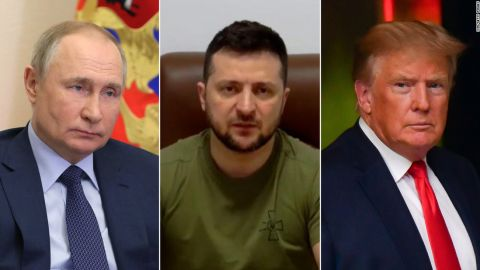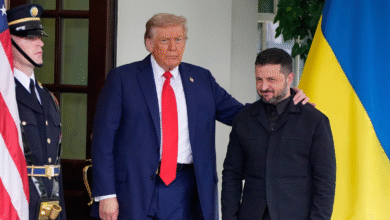Trump Warns Putin About Ukraine: Threat of Bombing Moscow

In an audacious revelation, Trump warns Putin about Ukraine, claiming he told the Russian leader that any aggression into Ukraine would lead to severe consequences for Moscow. This assertive stance demonstrates Trump’s willingness to confront Russia amidst escalating tensions in the Russia-Ukraine conflict. Notably, he extends similar warnings to Chinese President Xi Jinping, emphasizing his approach to dealing with global threats, including Taiwan. Trump’s remarks come as he seeks to garner support from campaign donors, illustrating his strategic positioning on international relations in light of ongoing geopolitical crises. With a backdrop of Moscow bombing threats and his strong rhetoric against both Putin and Xi, Trump’s comments reflect a pivotal moment in his political narrative that aims to resonate with his base as he eyes the 2024 presidential race.
In a striking assertion of international diplomacy, former President Donald Trump has apparently conveyed a stark warning to Vladimir Putin concerning potential military action in Ukraine. By drawing parallels with his demeanor towards Xi Jinping regarding Taiwan, Trump illustrates a robust, albeit controversial, approach to thwarting perceived global aggressors. His tenure was marked by complex engagements with Russia and China, making Trump’s recent comments crucial for understanding contemporary geopolitical dynamics. This discourse around Trump’s threats—both to Moscow and Beijing—embodies broader concerns regarding stability in these regions and highlights the intertwining of campaign strategies and foreign policy. As tensions continue to simmer, especially in relation to the Russia-Ukraine conflict, Trump’s directness emphasizes the potential for serious implications on global security.
Trump Issues Stark Warnings to Putin Over Ukraine
In a recent revelation, former President Donald Trump disclosed that he warned Russian President Vladimir Putin about severe consequences if he decided to invade Ukraine. Trump stated, ‘If you go into Ukraine, I’m going to bomb the sh– out of Moscow.’ This bold claim, shared during a private meeting with campaign donors, underscores the gravity of the ongoing Russia-Ukraine conflict. Trump’s irreverent approach to diplomacy reflects a significant shift in his tone towards Russia upon his return to political prominence, signaling to both domestic and international audiences his stance on global threats.
These comments come amid heightened tensions surrounding Russia’s military actions. Trump’s assertion that he intended to take extreme measures serves as a formidable warning aimed at deterring further aggression in Eastern Europe. The implications of Trump’s rhetoric extend beyond just Ukraine; they resonate with broader geopolitical strategies as the world watches how global leaders navigate their relationships with powerhouses like Russia and China.
Trump’s Concerns Regarding Putin’s Actions
During a recent Cabinet meeting, Trump expressed his discontent with the current state of affairs in Russia, particularly in relation to the war in Ukraine. He remarked, ‘He’s killing a lot of people… his soldiers and their soldiers, mostly, and it’s now up to 7,000 a week.’ This alarming statistic highlights the escalating human cost of the Russia-Ukraine conflict, which has drawn widespread condemnation from international communities. Trump’s pointed remarks emphasize a critical stance that may signal a tougher approach towards Russia under his potential future administration.
Moreover, Trump’s criticisms indicate a potential pivot in his foreign policy strategy, particularly if he were to reclaim the presidency in 2024. His aggressive posture towards Putin could draw support from voters concerned about national security and foreign policy. As the war continues to evolve, how Trump positions himself in relation to Russia and Ukraine may play a significant role in shaping public perception and mobilizing campaign support.
Warnings to Xi Jinping on Taiwan
In addition to his comments about Putin, Trump asserted that he issued a similar warning to Chinese President Xi Jinping regarding Taiwan. At the same donor meeting, Trump claimed he told Jinping, ‘If you invade Taiwan, you will face severe repercussions.’ This parallels his aggressive rhetoric used towards Russia, emphasizing his approach to deterrence when it comes to countries that threaten U.S. interests. Trump’s remarks not only reflect his strategic thinking but also highlight the delicate balance of power in the Asia-Pacific region, where tensions with China remain high.
The U.S.-China relationship is complex, and Trump’s comments reflect an understanding of the significance of Taiwan in global geopolitics. As China continues to assert its military presence in the region, Trump’s tough stance might resonate with voters concerned about national security and Taiwan’s sovereignty. The implications of such warnings highlight the ongoing strategic rivalry between the U.S. and China, potentially influencing international relations and trade agreements.
Impact of Trump’s Rhetoric on Global Relations
Trump’s candid assessments of leaders like Putin and Xi serve to reshape the narrative surrounding U.S. foreign policy. His willingness to adopt a tougher stance could attract support from hawkish elements within the Republican Party, eager for a more aggressive diplomatic strategy. The fear of aggression from both Russia and China underlines the necessity for a firm response, suggesting that Trump’s approach may be designed to resonate with a base concerned about international security threats.
Consequently, the responses to Trump’s statements may elicit varied reactions from Russia and China. While Putin may dismiss Trump’s threats, Xi’s reaction could be more cautious, given the potential ramifications for China if tensions escalate further. As global powers recalibrate their stances in response to Trump’s rhetoric, the impact on diplomacy and international alliances could have lasting effects.
Understanding the Russia-Ukraine Conflict
The Russia-Ukraine conflict, which escalated dramatically in early 2022, has drawn international attention and concern over regional security. This conflict’s roots can be traced back to a series of political upheavals and territorial disputes, but Trump’s comments bring attention to the current humanitarian crisis at stake. With thousands of lives lost and millions displaced, the situation in Ukraine demands urgent action from global leaders to seek a resolution.
Understanding the complexities of the Russia-Ukraine conflict is crucial in formulating effective responses to such aggressions. As Trump highlights the need for serious consequences for invasion, it raises important questions regarding the role of the United States in international conflicts and how leadership styles can influence outcomes. The situation remains fluid, and as both sides navigate their strategies, international support and interventions will likely be vital in determining the future stability of the region.
Reactions to Trump’s Threats from Global Leaders
Responses from global leaders regarding Trump’s threats reveal a spectrum of perspectives on his combative rhetoric. While some may perceive his approach as a necessary assertiveness against aggressors like Putin and Jinping, others may view it as reckless. The differing perceptions highlight the varied philosophies in foreign relations, particularly on how best to address aggressive actions without escalating tensions into outright conflict.
Moreover, as allies and nations observe Trump’s assertions, their reactions could indicate potential shifts in alliances or diplomatic strategies. Countries monitoring the situation may feel compelled to reassess their own defense strategies in light of Trump’s warnings, emphasizing the interconnectedness of global politics. Understanding these dynamics is crucial for forecasting future international relations and the potential for conflict resolution.
Trump’s Campaign Strategy Amid Global Tensions
As Trump gears up for the potential 2024 election, his remarks regarding global leaders play a significant role in his campaign strategy. By positioning himself as a strongman willing to take decisive action against threats from Russia and China, Trump aims to appeal to a voter base that prioritizes security and military strength. His narrative of being tough on bad actors echoes throughout his previous campaigns and signals a continuity in his approach to national security.
However, Trump’s contentious rhetoric also raises the stakes for his campaign, as it may polarize opinions among voters. While some embrace his aggressive style, others may critique it for lacking the nuance required in diplomatic relations. Balancing these viewpoints will be key as the election approaches and Trump’s campaign strategies unfold amidst ongoing global tensions.
Future Implications of Trump’s Comments on Global Politics
The future implications of Trump’s remarks towards Putin and Jinping may extend beyond mere threats; they could redefine the U.S. stance in global geopolitics. As Trump’s rhetoric gains traction among supporters, it invites a reconsideration of how aggressive actions are perceived and addressed by Western democracies. His assertive warning to Russia signifies a potential pivot in U.S. foreign policy, especially if he regains control of the presidency.
Additionally, the evolving dynamics between the U.S. and its adversaries highlight the critical nature of leadership in times of crisis. The impact of Trump’s comments will resonate as both allies and enemies analyze the U.S. approach toward international conflicts. Balancing diplomacy with firmness will be essential as nations strive for stability amidst fluctuating global power structures. Trump’s words, therefore, carry more weight than mere bravado; they signal a call for vigilance in foreign affairs.
The Role of Campaign Donors in Shaping Trump’s Narrative
The role of campaign donors in influencing Trump’s narrative underscores the interconnected nature of politics and financial support. Trump’s private comments to wealthy donors about his threats against Putin and Jinping indicate how campaign contributions can impact political rhetoric and strategies. In a landscape where donor influence is significant, Trump’s ability to captivate high-profile supporters solidifies a stronger platform from which to launch his candidacy.
These intimate gatherings not only showcase Trump’s unfiltered views but also highlight the necessity of donor backing in shaping his political actions. As he prepares for 2024, the expectations of financial supporters may guide Trump’s approach to complex international challenges, posturing him as a candidate of strength and resolve. The intertwining of campaign finance and political messaging may redefine the dynamics of support and influence within the contemporary electoral landscape.
Frequently Asked Questions
What did Trump warn Putin about Ukraine according to recent reports?
President Donald Trump warned Russian President Vladimir Putin that if he invaded Ukraine, he would take extreme measures, reportedly stating he would ‘bomb the sh– out of Moscow.’ This comment reflects Trump’s aggressive stance towards the Russia Ukraine conflict.
How did Trump’s warning to Putin relate to his comments on China and Xi Jinping?
Trump’s warning to Putin about Ukraine parallels his comments to Chinese President Xi Jinping regarding Taiwan. He claimed to have similar threats to deter Jinping from invading Taiwan, emphasizing a tough approach to both Russia and China in geopolitical conflicts.
What was Trump’s tone towards Putin after returning to the White House?
After returning to the White House, Trump adopted a more critical tone towards Putin, expressing dissatisfaction with his actions in the Russia Ukraine conflict and highlighting the high casualties involved.
How did the public perceive Trump’s comments about bombing Moscow?
Trump’s comments about bombing Moscow were made candidly during private meetings with campaign donors, leading to mixed perceptions about his seriousness. Reports indicated that while Putin did not fully believe Trump’s threats, he acknowledged their weight.
What impact do Trump’s remarks have on his campaign donor relationships?
Trump’s bold statements regarding threats against both Moscow and Beijing seem to enhance his relationship with campaign donors, showcasing his confrontational stance against adversaries like Putin and Xi Jinping, which may resonate with their interests.
| Key Points |
|---|
| Trump warned Putin about invading Ukraine, threatening to bomb Moscow if he did so. |
| The warning was reported in a subsequent audio by CNN, where Trump recalled the conversation. |
| Trump also claimed to have made similar threats to Chinese President Xi Jinping, who dismissed them. |
| Since returning to the White House, Trump has adopted a more critical stance towards Putin. |
| During a Cabinet meeting, Trump expressed his discontent with Putin’s actions in Ukraine. |
| The reports highlight Trump’s candid conversations aimed at engaging campaign donors. |
Summary
Trump warns Putin about Ukraine by stating that he would bomb Moscow if Russia invaded. In recent statements, Trump has publicly criticized Putin for his actions in Ukraine and expressed concern over the humanitarian impact of the conflict. This development reflects Trump’s escalated rhetoric towards Russia since his return to the political landscape, indicating his strategy to assert a strong American stance on international aggression.




